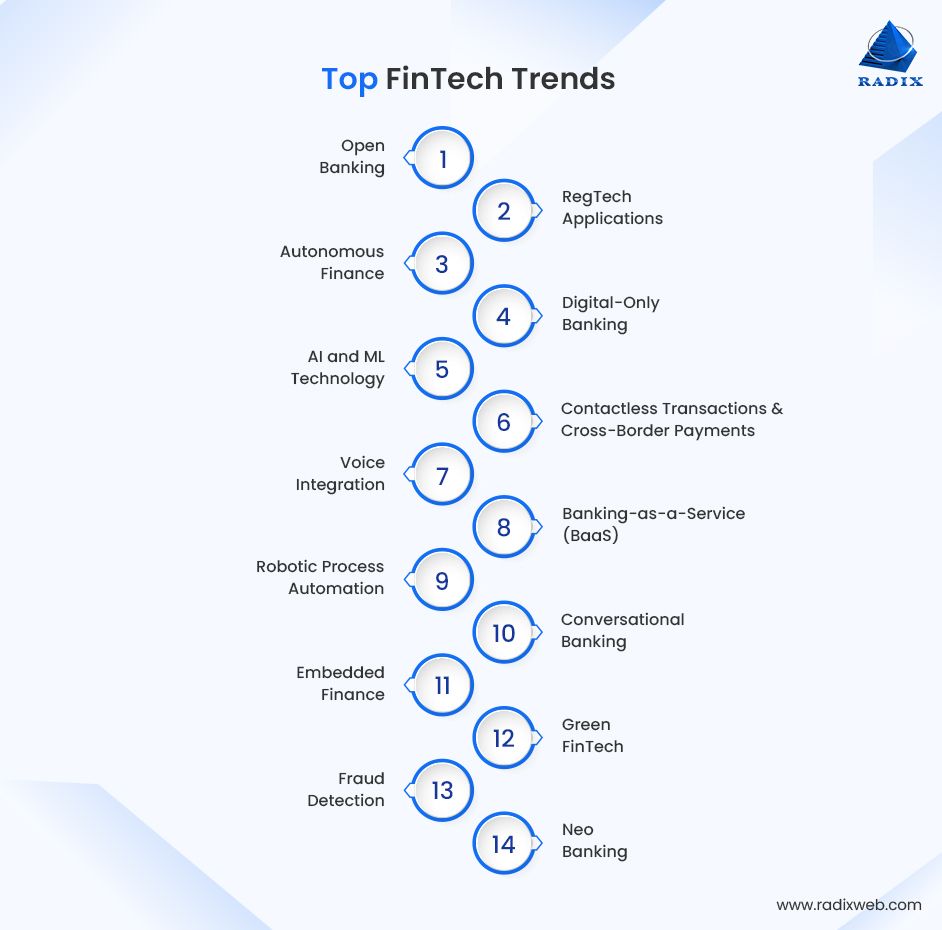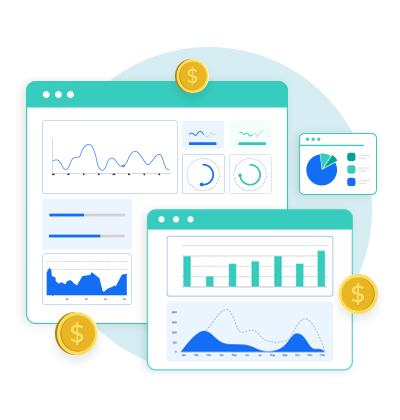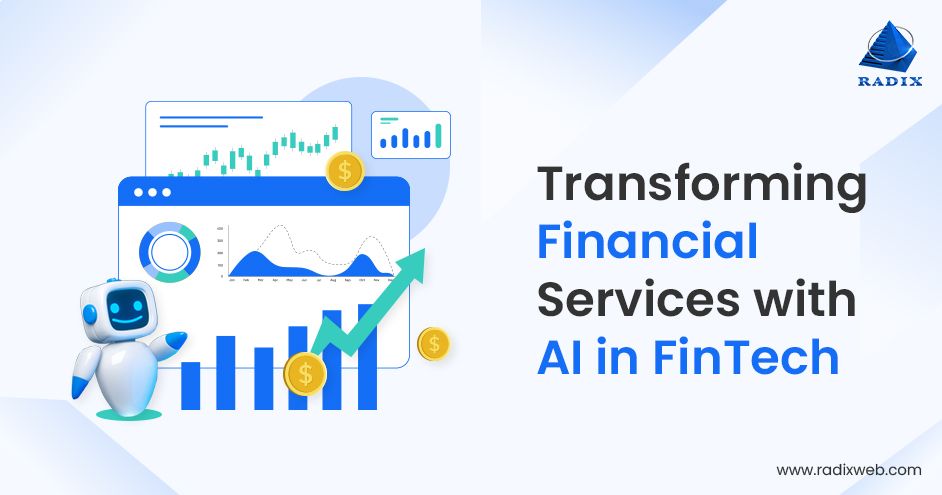Read More

Discover what’s next for AI in healthcare in 2026 - Get Access to the Full Report
Where’s FinTech Headed: By 2032, the FinTech industry will be worth $917.17 billion, growing at a 16.8% CAGR. That makes 2026 an exciting moment for exploring this space. In this blog, we break down strategic FinTech transformation trends and what to watch for in the coming years, so you can make smart, informed decisions and stay ahead in this fast-moving industry.
FinTech is reshaping the way we think about money, banking, and financial services. From automated payments and digital lending to AI-driven investment platforms, technology is redefining the financial landscape and FinTech software development is at the heart of this transformation.
The pace of this revolution is faster than anything we could have imagined just a few years ago.
Of course, this rapid growth comes with some challenges:
- Concerns around security
- Regulatory compliance
- Lingering adoption
Yet, the overall picture is overwhelmingly positive. According to a BCG report, FinTech revenues are projected to grow sixfold, surging to an astonishing $1.5 trillion by 2030
If you’re curious about why FinTech matters for your business, you’re in the right place. In this blog, we’ll take you through the top FinTech trends for 2026 and beyond, exploring FinTech disruption strategies and how innovation is creating new opportunities, transforming financial decision-making, and shaping the future of the FinTech industry.
Top FinTech Trends for 2026
In 2026, FinTech, short for financial technology, will drive smarter, faster, and more secure financial operations. This section covers the key trends every CIO, CTO, and finance leader needs to know to stay ahead in a digital-first financial landscape.

1. Open Banking
One of the top FinTech technology trends for this year is Open Banking, which focuses on efficient sharing of data among banks and financial service providers. With Open Banking, banks can securely share customers’ banking data with authorized providers who then provide related financial services. This helps banks modernize their operations and FinTech companies can get access to the data.
For example, if you are looking to shop for insurance, you can find pre-approved offers from providers that partner with your bank. This is possible as the insurance provider is able to access your banking data and give you more relevant and personalized offers.
However, even with data encryption, breaches have happened. Once these security lapses are taken care of, Open Banking is expected to grow even more.
| Why This Trend Matters | Proof in Action | Your First Move |
|---|---|---|
| Open Banking is expected to surpass $136B in market value by 2030, driven by API adoption and data-sharing regulations | Plaid enables thousands of apps (Venmo, Robinhood) to securely access bank data | Start by exposing read-only APIs for account balance and transaction history via a sandbox environment |
2. RegTech Applications
RegTech has now a major pillar of digital transformation in the banking and financial services sector. Short for Regulatory Technology, it is one of the most prominent emerging trends in FinTech and uses technology to monitor regulatory processes. Businesses in this niche typically deal with reporting, tracking, and compliance-related issues. Although the term first emerged in 2008, it has only recently seen enormous growth.
To properly bank on this trend, financial institutions have to ensure system security and protection from hacking, frauds, and data breaches.
| Why This Trend Matters | Proof in Action | Your First Move |
|---|---|---|
| The global RegTech market is projected to reach $70B by 2030 | ComplyAdvantage uses AI to automate AML and risk monitoring for banks | Automate one compliance workflow (e.g., KYC checks) using rule-based monitoring tools |
3. Autonomous Finance
Autonomous finance is emerging as a top FinTech trend for 2026, offering a smarter alternative to traditional, in-person financial services. By leveraging AI, machine learning, and automation, auto finance solutions allow customers to use virtual bankers on mobile platforms, which manage portfolios, analyze risks, and suggest the best investment and savings options. This reduces human error and improves decision-making, creating a seamless financial experience.
While the technology is currently expensive and not yet widely adopted, it holds great potential to transform the future of the FinTech industry
| Why This Trend Matters | Proof in Action | Your First Move |
|---|---|---|
| By 2027, 27% of enterprise finance decisions will involve autonomous AI agents | Wealthfront uses AI-driven algorithms for automated investing and portfolio rebalancing | Deploy AI-based portfolio recommendation models for low-risk customer segments first |
4. Digital-Only Banking
Digital banking is evolving rapidly, moving beyond traditional bank websites and apps to fully digital-only banks with no physical branches. This model is cost-effective for banks, which save on real estate, and convenient for consumers, who avoid travel and long waits. Many digital-only banks are already challenging traditional banks by offering affordable, feature-rich services.
While digital-only banks are promising and are becoming a major FinTech trend in asset management, caution is important. These banks are more vulnerable to financial fraud in the early stages and thus, customers need to ensure they only engage with tested and trusted options.
| Why This Trend Matters | Proof in Action | Your First Move |
|---|---|---|
| Digital-only banks are expected to serve over 4.2 billion users globally by 2026 | Revolut grew to 50M+ users without physical branches | Launch a digital-only savings or checking product under a separate brand to test adoption |
5. AI and ML Technology
Artificial intelligence (AI) and machine learning (ML) are the top emerging technologies reshaping fintech. Building AI software enables banks and FinTech companies to automate complex processes, reduce operational costs, enhance customer service through chatbots, and improve decision-making in areas like loans, investments, and fraud detection.
The use of AI in FinTech also helps combat money laundering, cybercrime, and other financial risks. While these FinTech innovations in 2026 offer significant efficiency and savings, the use of ML solutions may also raise ethical concerns about relying on technology for critical financial decisions.
| Why This Trend Matters | Proof in Action | Your First Move |
|---|---|---|
| AI will reduce bank operating costs by 22% by 2030, saving nearly $1T globally | JPMorgan Chase uses AI for contract analysis and fraud detection | Implement AI-driven fraud detection on high-volume transaction flows |
6. Contactless Transactions and Cross-Border Payments
Contactless transactions and cross-border payments are becoming major trends in FinTech, making global financial transactions faster, safer, and more convenient. With innovative FinTech app development, customers can now pay securely from anywhere using phones or cards, while businesses can speed up payment processing and reduce fraud.
As international trade grows and digital economies expand, these payment methods are driving more efficient FinTech solutions and are expected to remain a top FinTech trend for 2026 and beyond.
| Why This Trend Matters | Proof in Action | Your First Move |
|---|---|---|
| Global contactless payment volume will exceed $15.7T by 2029 | Wise (formerly TransferWise) enables fast, low-cost international payments | Integrate contactless NFC or QR-based payments for mobile-first users |
7. Voice Integration
Voice integration is emerging as one of the most important FinTech technology trends, driven by the growing preference for fast, personalized, and hands-free interactions. Voice-enabled banking allows users to perform transactions, receive financial guidance, and manage daily banking tasks simply through spoken commands. It also supports voice-based authentication, simplifying client verification by reducing reliance on PINs, passwords, and one-time codes.
Although security remains a key challenge, ongoing improvements in voice recognition and protection systems are expected to make voice payments and voice-enabled FinTech software solutions more widely adopted in the future.
| Why This Trend Matters | Proof in Action | Your First Move |
|---|---|---|
| Over 50% of digital banking interactions will be voice-enabled by 2026 | Bank of America’s Erica handles millions of voice interactions monthly | Enable voice-based balance inquiries using existing voice assistants (Alexa, Siri) |
8. Banking-as-a-Service (Baas)
Banking-as-a-Service (BaaS) is one of the emerging trends in FinTech that allows non-banking businesses to offer financial services through white-label banking solutions. By integrating digital banking capabilities, companies can provide services such as payments and lending without holding a banking license.
Banks can either build their own BaaS platforms or partner with third-party providers, making this model a cost-effective and efficient way to drive digital transformation. Adopting modular, service-oriented architectures enables financial institutions to deliver more flexible and innovative digital services.
| Why This Trend Matters | Proof in Action | Your First Move |
|---|---|---|
| BaaS market is projected to grow at 19.68% CAGR through 2030 | Stripe Financial Accounts enables platforms to embed banking features | Partner with a licensed BaaS provider to offer payments or wallets without a banking license |
9. Robotic Process Automation
Robotic Process Automation (RPA) is a key FinTech innovation that uses software robots to automate repetitive, rule-based tasks by mimicking human interactions with digital systems. In banking and financial services, RPA is used for activities such as customer onboarding, data entry, loan and claim processing, and customer support. It works seamlessly with existing systems without disrupting current workflows, helping institutions improve efficiency, reduce errors, and speed up operations.
By adopting RPA, financial organizations can streamline processes and deliver a smoother, more reliable customer experience.
| Why This Trend Matters | Proof in Action | Your First Move |
|---|---|---|
| RPA can reduce banking operational costs by 30–50% | UiPath powers automation for major global banks | Automate customer onboarding document verification using software bots |
10. Conversational Banking
Conversational banking is another growing FinTech trend that allows customers to check balances, manage loans or claims, and complete transactions through chat, messaging apps, or social platforms. It enables banks to interact with customers across multiple digital channels, making banking more flexible and accessible.
Now AI-powered chatbots play a key role by handling routine queries, assisting with marketing, and qualifying leads, while human agents step in for more complex needs. With features like chat, video calls, and screen sharing, conversational banking delivers personalized support and strengthens customer engagement with financial institutions.
| Why This Trend Matters | Proof in Action | Your First Move |
|---|---|---|
| 110.9 million customers are expected to interact with banking chatbots by 2026 | HSBC uses conversational AI for customer service and support | Launch a chatbot for FAQs and balance checks on web or mobile apps |
11. Embedded Finance
Rather than offering financial services as a separate step, embedded finance brings them directly into the products and platforms customers already use. Organizations are now working with FinTech software development companies to integrate payments, lending, or insurance into everyday digital experiences. With that, they are able to deliver smoother user journeys while creating new revenue opportunities.
This trend allows companies to add financial features without complex banking partnerships, helping them deepen customer engagement and redefine how financial services are accessed.
| Why This Trend Matters | Proof in Action | Your First Move |
|---|---|---|
| Embedded finance is expected to generate $230B in revenue by 2026 | Shopify Capital offers embedded lending to merchants | Add buy-now-pay-later (BNPL) at checkout through a fintech partner |
12. Green Fintech
Sustainability is becoming a core focus in the financial world, with green FinTech gaining strong momentum in 2026. A growing number of FinTech app ideas now help users understand the environmental impact of their spending, while investment platforms promote environmentally responsible choices. Green FinTech is not just about ethics though. It also makes business sense, as companies adopting sustainable financial solutions are building stronger customer loyalty and appealing to environmentally conscious users.
By combining technology with sustainability, green finance is evolving into a clear competitive advantage rather than an optional feature.
| Why This Trend Matters | Proof in Action | Your First Move |
|---|---|---|
| The global Green FinTech will be worth $45 billion by 2027 | Aspiration Bank (now GreenFi) offers carbon-neutral banking products | Introduce carbon footprint tracking based on transaction data |
13. Fraud Detection
Financial security has evolved far beyond basic password protection, with AI-powered fraud detection becoming a key FinTech trend. These intelligent systems, powered by cutting-edge technologies shaping the future of FinTech, monitor transactions in real time, identify unusual patterns, and prevent fraud before it occurs. By continuously learning from new threats, they adapt and grow more effective over time, providing stronger protection with minimal disruption to customers.
For businesses, this results in lower fraud losses, improved efficiency, and greater customer trust, while users benefit from a secure experience that works quietly in the background.
| Why This Trend Matters | Proof in Action | Your First Move |
|---|---|---|
| AI-driven fraud detection reduces fraud losses by up to 70% in many cases | Visa Advanced Authorization uses real-time AI risk scoring | Deploy real-time anomaly detection models for card and UPI payments |
14. Neo Banking
Neobanks are evolving beyond basic digital accounts to offer fully personalized financial ecosystems that adapt to individual user needs. With features like instant account setup, AI-driven budgeting support, and real-time spending insights, they make financial management simpler and more intuitive. By operating entirely on digital platforms, neobanks are expanding access to modern financial tools for users who were previously underserved. It is proving that banking can be seamless, affordable, and user-friendly.
Supported by modern APIs and FinTech app development solutions, this FinTech innovation in 2026 is becoming increasingly accessible for businesses looking to integrate financial services into their digital offerings.
| Why This Trend Matters | Proof in Action | Your First Move |
|---|---|---|
| Neo banks will grow at 54.8% CAGR between 2023–2030 | Monzo delivers personalized, mobile-first banking | Launch an AI-powered budgeting and insights feature for retail users |
With that, it is a wrap on our list of the key fintech trends enterprises should watch. The next step is for you to see which trends you can bank on to lead the FinTech revolution.
Getting Started with FinTech Trends96% of customers report that they are satisfied with the FinTech products that they use. Also, businesses continue to invest in FinTech innovations in 2026 and the market size is growing. This growth is despite global challenges like shifting consumer expectations and economic downturns. To support this progress, the ecosystem must work together to create an open, fair, and integrated financial system. If you also want to be part of the growing FinTech market and now is the right time to get started with emerging FinTech trends before they become mainstream.However, choosing the right partner is equally crucial. At Radixweb, we can help you build custom software solutions tailored to the unique needs of your FinTech business. Our expertise lies in using modern cutting-edge technology and incorporating relevant trends to drive not only strong implementation but also tangible outcomes. We also offer a no-cost ideation session with our experts where we understand your needs and suggest the FinTech trends worth considering. Book your slot for tailored guidance on how to get started with FinTech.
Frequently Asked Questions
What's the next big thing in fintech?
What are the 5 key technologies in fintech?
What is the future of fintech in 2025?
Ready to brush up on something new? We've got more to read right this way.









